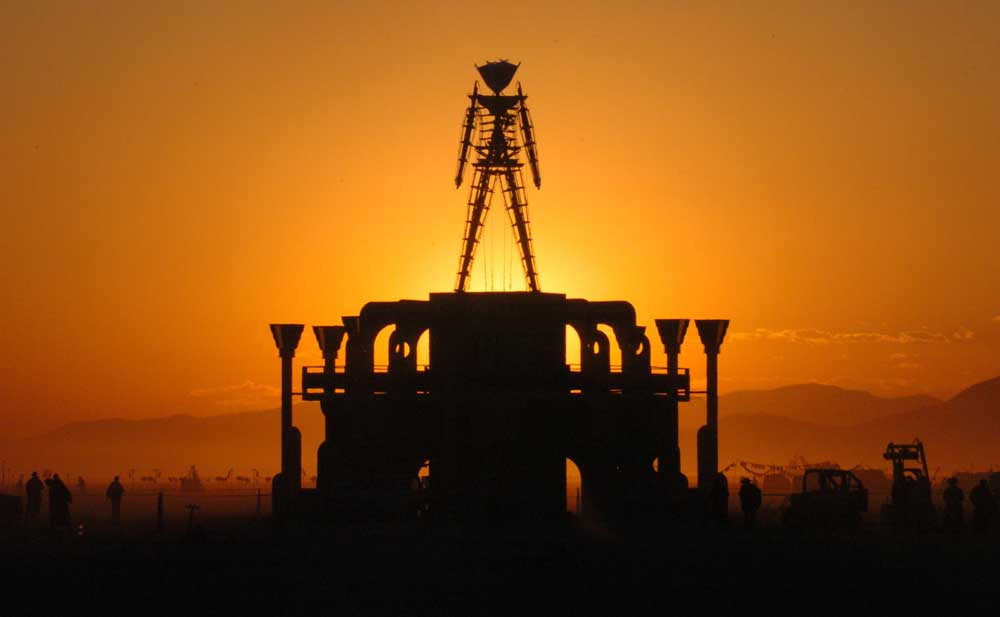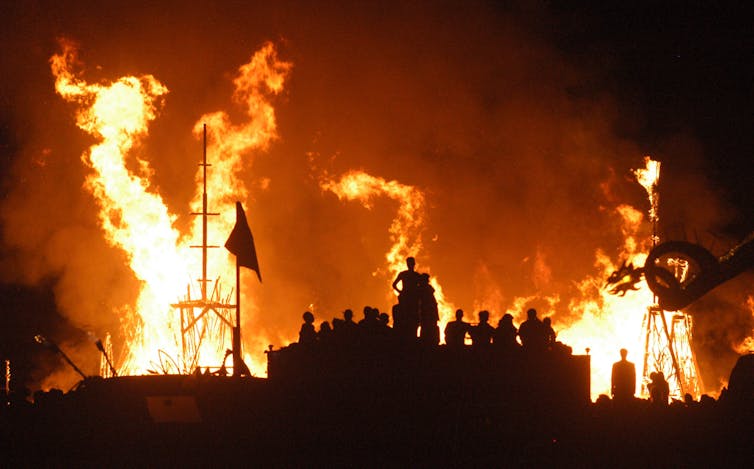
By Dimitris Xygalatas
At the end of each summer, hordes of people flock to the Black Rock Desert in Nevada to erect a makeshift city the size of the Italian town of Pisa. They call it Black Rock City. A few days later, they will burn it to the ground, leaving no trace.
During their time together, they partake in an extravaganza of unique experiences. Wearing wild costumes and riding carnivalesque vehicles, they attend colorful parades, spectacular light displays and interactive art installations.
Since its inception in 1986, attendance has increased from a few dozens of individuals to over 70,000 — and hundreds of thousands in various regional versions around the world.
In surveys, Burners, as they call themselves, report experiencing strong feelings of connection during the event. Over three-quarters say that their experience was transformative, over 90% say that these transformative effects lasted beyond their stay, and over 80% say that they made a permanent impact on their lives. The great majority return again, many of them every year.
What makes this bizarre event so meaningful to so many people?
The ceremonial experience
The overwhelming majority of Burners identify as nonreligious, yet the deeply spiritual experiences they report resemble those of religious groups. Indeed, the similarities with religion are no accident.
Burning Man, as the event became known, started as a solstice get-together by a handful of friends on Baker Beach in San Francisco. In 1986, they decided to build a wooden effigy and then torch it. Co-founder Larry Harvey called this a “spontaneous act of radical self-expression.” As people started gathering to watch, they realized they had created a ritual. The next year, they put up fliers and drew a bigger crowd. It has been growing ever since.
Harvey was an avid reader of anthropological theories of religion. He was particularly interested in the role of ritual in creating meaningful experiences. These experiences, he argued, address a primordial human need: “The desire to belong to a place, to belong to a time, to belong to one another, and to belong to something that is greater than ourselves, even in the midst of impermanence.”
As an anthropologist of ritual myself, I can see that ceremony is at the essence of Burning Man. It begins as soon as Burners walk through the gate. Upon entering, people signal their arrival by ringing a bell. They hug and greet each other by saying “Welcome home!” That home is treated as sacred, symbolically demarcated and protected from the polluting influence of the “default world,” as they call the outside. Upon their departure, they will perform a purification rite, removing all “matter out of place” – anything that doesn’t belong to the desert, from plastic bottles to specs of glitter.
Leaving their default name behind them, they use their “playa name.” It is a name gifted to them by another Burner and used to signify their new identity in the playa (the desert basin). They also abandon many of the comforts of the outside world. Monetary transactions are not allowed, and neither is bartering. Instead, they practice a gift economy, modeled on traditional ceremonial customs.
Anthropologists have noted that such ceremonial exchange systems can have important social utility. Unlike economic exchanges that produce equivalent outcomes, each act of donation creates feelings of gratitude, obligation and community, increasing both personal satisfaction and social solidarity.
The Burning Man Temple is yet another testament to the power of ritual. When sculptor David Best was invited to build an installation in 2000, he erected a wooden structure without any use in mind. But when a crew member died in a motorcycle accident, visitors started bringing mementos of people they had lost, and later gathered to watch it burn at the end of the event.
Since then, the temple has become a symbol of mourning and resilience.
Its walls are covered with thousands of notes, photographs and memorabilia. They are reminders of things people wish to leave behind: a personal loss, a divorce, an abusive relationship. It is all consumed by the fire on the final night as onlookers gather to watch silently, many of them in tears. Such a simple symbolic act seems to have surprisingly powerful cathartic effects.

AP Photo/Ron Lewis
The weeklong event culminates with the ceremonial destruction of the two largest structures looming at the center of the ephemeral city. On the penultimate night, a wooden effigy known as “the Man” is reduced to ashes. And in the final act, everyone gathers to watch the burning of the temple.
The human thirst for ritual
The oldest known ceremonial structures, such as Göbekli Tepe in Turkey, predate agriculture and permanent settlement. Although they took enormous effort to build, they too, like Black Rock City, were only used by ephemeral communities: groups of hunter-gatherers who traveled long distances to visit them.
It is not until hundreds of years later that evidence of settlement in those areas was found. This led archaeologist Klaus Schmidt to propose that it was the thirst for ritual that led those hunter-gatherers to permanent settlement, paving the way for civilization.
Whether this radical hypothesis is historically true is hard to know. But phenomena like Burning Man could confirm the view that the human need for ritual is primeval. It both predates and extends beyond organized religion.
Burning Man defies a strict definition. When I asked Burners to describe it, they used term such as movement, community, pilgrimage or social experiment. Whatever it might be, Burning Man’s unprecedented success, I believe, is due to its ability to create meaningful experiences for its members, which reflect a greater human yearning for spirituality.
![]()
Dimitris Xygalatas is Associate Professor of Anthropology and Psychological Sciences at the University of Connecticut.





























Bartholomew says
I would love to go to Burning Man, I am not sure if me and my wife are cut out for it though.
charley says
hell has enlarged itself. isaiah 5-14. this fesival is demonic and from hell
repent jesus christ saves sinners.